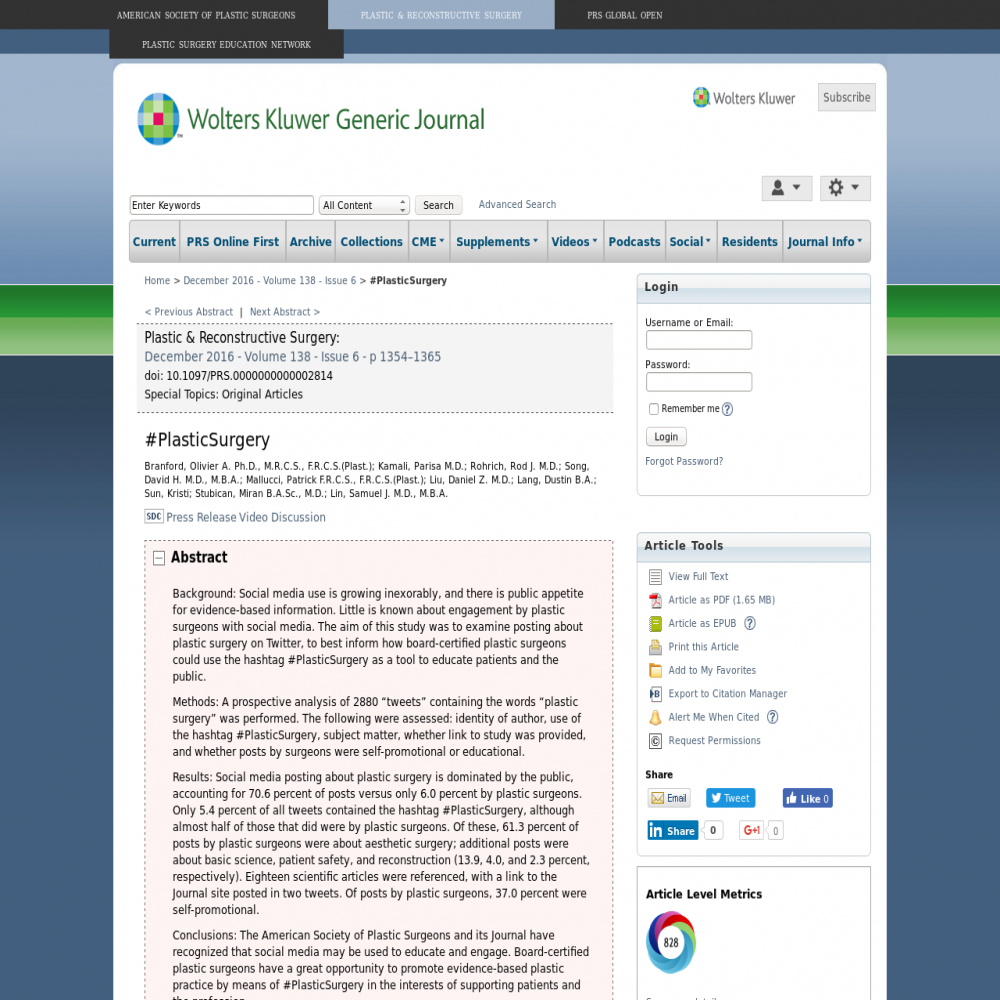#PlasticSurgery
A healthcare social media research article published in Plastic and Reconstructive Surgery, December 1, 2016
- Title
- #PlasticSurgery
- Authors (alpha)
- Daniel Z Liu, David H. Song, Dustin Lang, Kristi Sun, Miran Stubican, Olivier A Branford, Parisa Kamali, Patrick Mallucci, Rod J Rohrich, Samuel J Lin
- Published
- December 1, 2016
- Journal
- Plastic and Reconstructive Surgery
- Impact Factor
- 3.087
- DOI
- 10.1097/PRS.0000000000002814
- Pubmed
- 27879607
- Altmetric
Abstract
Social media use is growing inexorably, and there is public appetite for evidence-based information. Little is known about engagement by plastic surgeons with social media. The aim of this study was to examine posting about plastic surgery on Twitter, to best inform how board-certified plastic surgeons could use the hashtag #PlasticSurgery as a tool to educate patients and the public. A prospective analysis of 2880 "tweets" containing the words "plastic surgery" was performed. The following were assessed: identity of author, use of the hashtag #PlasticSurgery, subject matter, whether link to study was provided, and whether posts by surgeons were self-promotional or educational. Social media posting about plastic surgery is dominated by the public, accounting for 70.6 percent of posts versus only 6.0 percent by plastic surgeons. Only 5.4 percent of all tweets contained the hashtag #PlasticSurgery, although almost half of those that did were by plastic surgeons. Of these, 61.3 percent of posts by plastic surgeons were about aesthetic surgery; additional posts were about basic science, patient safety, and reconstruction (13.9, 4.0, and 2.3 percent, respectively). Eighteen scientific articles were referenced, with a link to the Journal site posted in two tweets. Of posts by plastic surgeons, 37.0 percent were self-promotional. The American Society of Plastic Surgeons and its Journal have recognized that social media may be used to educate and engage. Board-certified plastic surgeons have a great opportunity to promote evidence-based plastic practice by means of #PlasticSurgery in the interests of supporting patients and the profession.
Altmetric
The Altmetric Attention Score is based on the attention a research article gets on the internet. Each coloured thread in the circle represents a different type of online attention and the number in the centre is the Altmetric Attention Score. The score is calculated based on two main sources of online attention: social media and mainstream news media.
Healthcare Social Media Research
See the full list of healthcare social media research articles with data from or reference to Symplur.
#hcsmR is a collaboration between Stanford Medicine X and Symplur.


